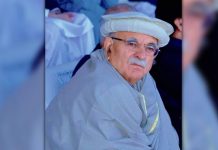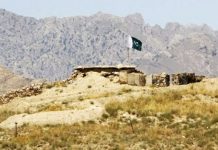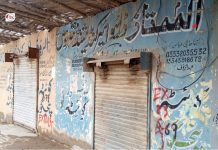Author: Kambar Baloch
Khair Baksh Marri laid the ideological foundation of the National Liberation Movement, and Ghulam Mohammad shaped the political sphere and inculcated idea of Baloch liberty amongst the masses. Karima followed the path and became the Flambeau of political resistance.
Karima grew up with the characters of Shaheed Hameed, Fida Ahmed, and Hatunan Bibi. She spent her childhood hearing the stories of colonisation, resistance of the 1970s and it’s stalwart leader comrade KB, who stood firm and refused to bow down to the state for decades, from her uncle Wahid Kambar, one of the initiators of the ongoing insurgency particularly in Makran.
In Baloch political history, as we contemplate the role of women in the national struggle, we see Karima is the foremost figure. Hardly there is any fearless women like her who could fight against all odds. She inspired a generation of young educated female activists who are now in the frontline to echo their voice against the brutal and repressive state policy against the Baloch.
She ventured into politics as a teenage girl and shattered the hitherto unshakable bonds of conservative customs prevalent in the Baloch society. Her story is incompatible with the other warriors’. She had to defy several proverbial odds like fundamentalists, mullas, and colonisers. And she did like none other had ever done.
With the emergence of the insurgency, state counter-insurgency policies began to emanate, and the technique of enforced disappearances arose Balochistan. The political cadres were being the first target. It started with the enforced disappearance of Noora Marri and Gul Hasan and it continues till date. From here, a new era began in Baloch politics, and women started partaking in demonstrations.
A girl with lustrous eyes emerged at Shaheed Fida chowk to resist oppression, and her voice echoed against the state repression of the Baloch nation. Her persistent endeavour and triumph over the hurdles of a tyrant state earned her the title of Banuk, (The revered Lady)
With Karima’s journey the Baloch politics entered into a new phase. In other words she added a new chapter to Baloch history.
Instead of priding on National vanguards, Banuk acknowledged that, in order to stand with the Baloch cause, she needed to dedicate herself to a front that required enormous sacrifices.
Banuk Karima joined Baloch Students Organisation Azad, when there was no concept of female participation in politics. BSO formed its female wing in 2005, and she was elected as the president of Tump Zone, her home town. It was the first time in Baloch history, that a girl got involved in politics—politics for the independence of Balochistan.
Banuk irresistibly struggled and strived for women’s liberty in Baloch society which was deeply under the influence of patriarchy. Her struggle was, however, not meant solely for women alone. It was rather an idea of emancipation for the oppressed masses of her motherland. To put it precisely, she inspired a generation of educated Baloch women to join the politics of resistance, in order to snap the chains and fetters of slavery and subjugation.
BSO Azad is known to be the pioneer of the new tendencies in Baloch politics. It deliberately decided to persuade the women to participate in the national struggle. In 2006, its Politburo selected Karima as central committee member of the organization.
Balach khan Marri’s strategies in the armed front, and Akbar Khan Bugti’s political wisdom and insight gave an impetus to the Baloch insurgency. An unprecedented uprising erupted in the wake of their martyrdom which engulfed the entire Baloch nation. The situation is becoming increasingly pernicious as the conflict progresses.
On the first anniversary of Dil Jan and Banuk’s uncle Dr. Khalid’s martyrdom, a political gathering was held in Tump, Instead of mourning them, the event was organised to honour them for their devotion and sacrifices for a great cause.
She covered her face with her shawl. The moment her magnificent greenish-blue eyes came into view; as her unshakable voice echoed in the air an eerie silence prevailed. Unflinching, Karima boldly convinced her people that Dr. Khalid and Dil Jan laid their lives for the emancipation of their people. She reiterated that it was necessary for each household to have a fighter, either political or armed, for a greater Balochistan.
Karima, then 22 years old, was elected vice chairperson of BSO Azad in a session held at Balochistan University Shaal (Quetta) in 2008. She successfully organized the Baloch youth to break the chains of servitude. She was no longer active in Turbat or Makuran; rather, the torch of her struggle was pouring out light of inspiration from Jewani to Shaal.
In 2009, when brutality and injustice reached their worst, Pakistan implemented its notorious kill and dump policies. Thousands of political activists were whisked away and their disfigured bodies—bodies distorted beyond identity—were thrown into desolate areas. It began with the bodies of chairman Ghulam Mohammad, and his companions, Lala Munir and Sheer Mohammad.
Zakir Majeed and hundreds of cadres were enforcedly disappeared. Kambar Chakar and Sangat Sana’s bullet-ridden bodies were found dumped in Kech. Bashir Zaib and senior leadership went underground, and Karima was the one in the hierarchy to lead the students, unite the masses, and associate them with the national aim to decolonise the Baloch land.
Many became fatigued and terrified, but Banuk, with fearless eyes, stood firm like a mountain in front of the oppressor. In rallies, protests, or organisational meetings from Makuran to Jalawan and Rakshan to Koh e Suleman, Karima prevailed; she took on and fulfilled the responsibilities of the political front.
Banuk was elected as senior vice chairperson of BSO Azad in the session held at Mashkey in 2012. The movement was then embroiled in a power struggle that tarnished the stature of the insurgency. Popular support on various fronts of the movement declined. Fortunately, she kept the hope alive and steered the boat out of turbulent water.
BSO was banned by the state, and Karima’s comrade in arms, Raza Jahangir, was martyred, yet the brutality didn’t end. Zahid Kurd was forcedly disappeared in front of her. It was a tempestuous period for the organisation. But yet, she remained unshakable as usual.
Karima travelled across the length and breadth of Balochistan to reorganise BSO Azad and sow the seeds of freedom and liberty in the fertile soil of the Baloch land. She led the students and was the flag-bearer of emancipation in the political front.
She has vanquished the so-called conservative mindset and, in 2015, elected as the first ever female chairperson of BSO Azad in Balochistan’s political history. Hundreds of political crusaders were encouraged by her to become the torchbearers of nationalism.
She was sent to Canada by the central cabinet of Baloch Students Organisation Azad in November 2015 to raise her voice in global forums against Pakistan’s repressive policies against Balochistan.
But Balochistan was in the worst condition possible since Karima was sent abroad. Until now, there has been no one who could fill this void. This decision have been counterproductive for Baloch politics.
For two decades, Pakistan has been exercising collective punishment to prevent genuine political activists in Balochistan. In a futile quest to intimidate Karima, state authorities forcibly disappeared her uncle, Noor Ahmad but she was unfamiliar with the art of bowing down state coercion. Thus, they killed Noor Ahmad, threw his mutilated body but Karima continued her struggle till her last breath.
She was assassinated by Pakistan on December 21, 2020, in Canada, she had immortalised herself as a beacon of light though. With her assassination, the coloniser not only inflicted a psychological wound on us but it also deprived us of a national leader. Her absence will continue to haunt us for decades.
Banuk is irreplaceable indeed; her comrades in arms have raised the bar of this caravan and infused a hope in the struggle for the liberation of Balochistan. Today women are the vanguard of the resistance of the contemporary Baloch movement; today, in every sphere of life, they have managed to break all kinds of shackles.
Karima’s sacrifices and unceasing efforts were seminal in reshaping the politics of resistance in Balochistan. The Flambeau Banuk Karima’s unwavering commitment illumines hundreds of political cadres, and cadre as Fidai Shari Baloch’ ignited spark gave a new dimension to the armed front.
Banuk was reminded by Khair Baksh Mari. He said, “You are the inheritors of the war,” and she was one of the most outspoken voices of the Baloch Movement, but before reshaping the political spectrum for the War of Liberation, she got martyred far too early and young.
Once, Karima recalled a moment around 2010, in which she participated at a political rally accompanied by Kambaro (Kambar Chakar) at Turbat Shaheed Fida chowk. She said:
“Kambar came and sat beside me. Engrossed in his thoughts, he drew some lines on the ground. Even though he isn’t with us physically, his thoughts and those lines are here to reflect his existence as a compatriot with us”.
Like Kambar, Karima too drew the lines that: “We never kneel, we will prevail”. These lines will continue to persuade the masses of Baloch land to resist the tyrant state.
Disclaimer: The views and opinions expressed in this article are those of the author and do not necessarily reflect the official policy or position of The Balochistan Post or any of its editors.





























